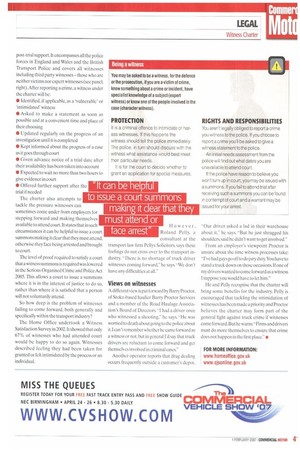With protedion
Page 40

Page 41

If you've noticed an error in this article please click here to report it so we can fix it.
1 f you've ever thought twice about contacting the police as a witness to a fatal road accident, lorry hijacking or theft, then be reassured — from next year the Government aims to ma I, e the whole process much more comfortable.
The Witness Charter, to be launched next April, implements new standards of service that witnesses in criminal cases can expect to receive throughout every step of the legal process.The primary aim of the Witness Charter is to bring more offences to justice by encouraging more witnesses to come forward.
At present there is no specific guidance on how witnesses should be treated when they are reporting a crime., including the process of making a statement.
The charter covers every stage from reporting a crime to post-trial support. It encompasses all the police forces in England and Wales and the British Transport Police and covers all witnesses including third party witnesses— those who are neither victims nor expert witnesses (see panel, right). After reporting a crime, a witness under the charter will be: • Identified, if applicable, as a 'vulnerable' or 'intimidated' witness • Asked to make a statement as soon as possible and at a convenient time and place of their choosing • Updated regularly on the progress of an investigation until it is completed • Kept informed about the progress of a case as it goes through court • Given advance notice of a trial date after their availability has been taken into account • Expected to wait no more than two hours to give evidence in court • Offered further support after the trial if needed The charter also attempts to tackle the pressure witnesses can sometimes come under from employers for stepping forward and making themselves available to attend court. It states that in such circumstances it can be helpful to issue a court summons making it clear that they must attend, otherwise they face being arrested and brought to court.
The level of proof required to satisfy a court that a witness summons is required was lowered in the Serious Organised Crime and Police Act 2005. This allows a court to issue a summons where it is in the interest of justice to do so, rather than where it is satisfied that a person will not voluntarily attend.
So how deep is the problem of witnesses failing to come forward, both generally and specifically within the transport industry?
The Home Office undertook a Witness Satisfaction Survey in 2002.1t showed that only 67% of witnesses who had attended court would be happy to do so again. Witnesses described feeling they had been taken for granted or felt intimidated by the process or an individual. It is a criminal offence to intimidate or harass witnesses. If this happens the
witness should tell the police immediately. The police, in turn should discuss with the witness what assistance would best meet their particular needs.
It is for the court to decide whether to grant an application for special measures.
However, Roland Pelly, a consultant at the transport law firm Pellys Solicitors, says these feelings do not cross over to the transport industry. -There is no shortage of truck driver witnesses coming forward," he says. We don't have any difficulties at all."
A different view is put forward by Barry Proctor. of Stoke-based haulier Barry Proctor Services and a member of the Road Haulage Association's Board of Directors...I had a driver once who witnessed a shooting," he says. "He was worried to death about going to the police about it. I can't remember whether he came forward as a witness or not, but in general I'd say that truck drivers are reluctant to come forward and get themselves involved in criminal cases:' Another operator reports that drug dealing occurs frequently outside a customer's depot. You aren't legally obliged to report a crime you witness to the police. If you choose to report a crime you'll be asked to give a witness statement to the police.
An initial needs assessment from the police will find out what dates you are unavailable to attend court.
If the police have reason to believe you won't turn up in court, you may be issued with a summons. If you fail to attend trial after receiving such a summons you can be found in contempt of court and a warrant may be issued for your arrest.
"Our driver asked a lad in their warehouse about it," he says. "But he just shrugged his shoulders, said he didn't want to get involved."
From an employer's viewpoint Proctor is unsure about the time witness processes take: "I've had guys go off to do jury duty.You have to stand a truck down on those occasions. If one of my drivers wanted to come forward as a witness I suppose you would have to let him."
He and Pelly recognise that the charter will bring some benefits for the industry. Pelly is encouraged that tackling the intimidation of witnesses has been made a priority and Proctor believes the charter may form part of the general fight against truck crime if witnesses come forward. But he warns:"Firms and drivers must do more themselves to ensure that crime does not happen in the first place." •


























































































































































































